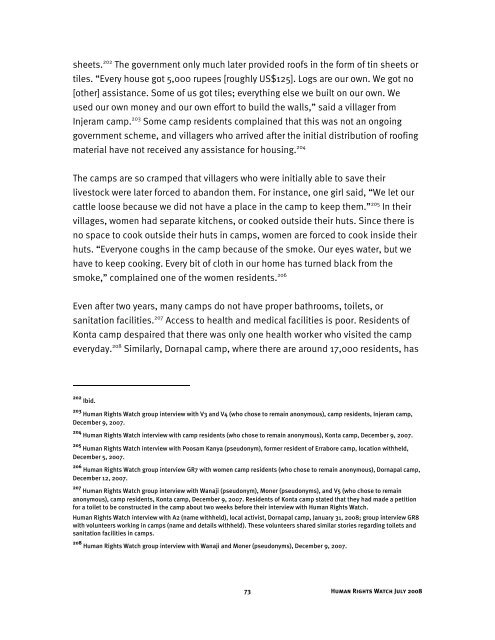âBeing Neutral is Our Biggest Crimeâ - Global Coalition to Protect ...
âBeing Neutral is Our Biggest Crimeâ - Global Coalition to Protect ...
âBeing Neutral is Our Biggest Crimeâ - Global Coalition to Protect ...
You also want an ePaper? Increase the reach of your titles
YUMPU automatically turns print PDFs into web optimized ePapers that Google loves.
sheets. 202 The government only much later provided roofs in the form of tin sheets or<br />
tiles. “Every house got 5,000 rupees [roughly US$125]. Logs are our own. We got no<br />
[other] ass<strong>is</strong>tance. Some of us got tiles; everything else we built on our own. We<br />
used our own money and our own effort <strong>to</strong> build the walls,” said a villager from<br />
Injeram camp. 203 Some camp residents complained that th<strong>is</strong> was not an ongoing<br />
government scheme, and villagers who arrived after the initial d<strong>is</strong>tribution of roofing<br />
material have not received any ass<strong>is</strong>tance for housing. 204<br />
The camps are so cramped that villagers who were initially able <strong>to</strong> save their<br />
lives<strong>to</strong>ck were later forced <strong>to</strong> abandon them. For instance, one girl said, “We let our<br />
cattle loose because we did not have a place in the camp <strong>to</strong> keep them.” 205 In their<br />
villages, women had separate kitchens, or cooked outside their huts. Since there <strong>is</strong><br />
no space <strong>to</strong> cook outside their huts in camps, women are forced <strong>to</strong> cook inside their<br />
huts. “Everyone coughs in the camp because of the smoke. <strong>Our</strong> eyes water, but we<br />
have <strong>to</strong> keep cooking. Every bit of cloth in our home has turned black from the<br />
smoke,” complained one of the women residents. 206<br />
Even after two years, many camps do not have proper bathrooms, <strong>to</strong>ilets, or<br />
sanitation facilities. 207 Access <strong>to</strong> health and medical facilities <strong>is</strong> poor. Residents of<br />
Konta camp despaired that there was only one health worker who v<strong>is</strong>ited the camp<br />
everyday. 208 Similarly, Dornapal camp, where there are around 17,000 residents, has<br />
202 Ibid.<br />
203 Human Rights Watch group interview with V3 and V4 (who chose <strong>to</strong> remain anonymous), camp residents, Injeram camp,<br />
December 9, 2007.<br />
204 Human Rights Watch interview with camp residents (who chose <strong>to</strong> remain anonymous), Konta camp, December 9, 2007.<br />
205 Human Rights Watch interview with Poosam Kanya (pseudonym), former resident of Errabore camp, location withheld,<br />
December 5, 2007.<br />
206 Human Rights Watch group interview GR7 with women camp residents (who chose <strong>to</strong> remain anonymous), Dornapal camp,<br />
December 12, 2007.<br />
207 Human Rights Watch group interview with Wanaji (pseudonym), Moner (pseudonyms), and V5 (who chose <strong>to</strong> remain<br />
anonymous), camp residents, Konta camp, December 9, 2007. Residents of Konta camp stated that they had made a petition<br />
for a <strong>to</strong>ilet <strong>to</strong> be constructed in the camp about two weeks before their interview with Human Rights Watch.<br />
Human Rights Watch interview with A2 (name withheld), local activ<strong>is</strong>t, Dornapal camp, January 31, 2008; group interview GR8<br />
with volunteers working in camps (name and details withheld). These volunteers shared similar s<strong>to</strong>ries regarding <strong>to</strong>ilets and<br />
sanitation facilities in camps.<br />
208 Human Rights Watch group interview with Wanaji and Moner (pseudonyms), December 9, 2007.<br />
73<br />
Human Rights Watch July 2008
















